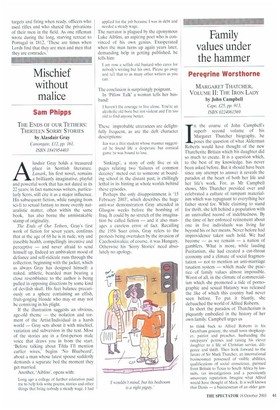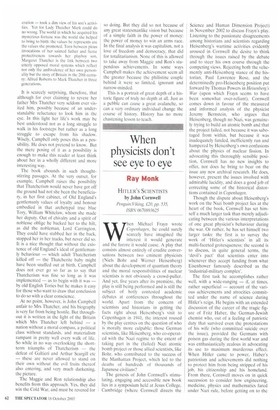Family values under the hammer
Peregrine Worsthorne
MARGARET THATCHER, VOLUME II: THE IRON LADY by John Campbell Cape, 125, pp. 913, ISBN 0224061569 1 n the course of John Campbell's superb second volume of his Margaret Thatcher biography, he poses the question of what Alderman Roberts would have thought of the new Thatcherite Britain which his daughter did so much to create. It is a question which, to the best of my knowledge, has never been asked before. But it should have been since any attempt to answer it reveals the paradox at the heart of both her life and her life's work. For, as Mr Campbell shows, Mrs Thatcher presided over and celebrated a culture of rampant materialism which was repugnant to everything her father stood for. While claiming to stand for thrift, she left behind a population with an unrivalled record of indebtedness. By the time of her enforced retirement about one in five individuals was living far beyond his or her means. Never before had improvidence taken such hold. We had become — as we remain — a nation of gamblers. What is more, while lauding Puritanism, she had created a cut-throat economy and a climate of social fragmentation — not to mention an anti-marriage taxation system — which made the practice of family values almost impossible. Worst of all, in the climate of commercialism which she promoted a tide of pornographic and sexual blatancy was released the like of which this country had never seen before. To put it bluntly, she debauched the world of Alfred Roberts.
In short the paradox of Thatcherism is piquantly embodied in the history of her own family. Campbell urges us
to think back to Alfred Roberts in his Grantham grocery, the small town shopkeeper, patriot and preacher, husbanding the ratepayers' pennies and raising his clever daughter to a life of Christian service, diligence and thrift. Then look forward to the future of Sir Mark Thatcher, an international businessman possessed of visible abilities, qualifications of social conscience, pursued from Britain to Texas to South Africa by lawsuits, tax investigations and a persistently unsavoury reputation. Imagine what Alfred would have thought of Mark. It is well known that Denis — a businessman of an older gen eration — took a dim view of his son's activities. Yet for Lady Thatcher Mark could do no wrong. The world in which he acquired his mysterious fortune was the world she helped to bring to birth: the values he represents are the values she promoted. Torn between pious invocations of her sainted father and fierce protectiveness towards her playboy son, Margaret Thatcher is the link between two utterly opposed moral systems which reflect not only the ambivalence of her own personality but the story of Britain in the 20th century: Alfred Roberts to Mark Thatcher in three generations.
It is scarcely surprising, therefore, that although for ever claiming to revere her father Mrs Thatcher very seldom ever visited him, possibly because of an understandable reluctance to look him in the eye. In this light her life's work may be best understood not as a long struggle to walk in his footsteps but rather as a long struggle to escape from his shadow. Wisely. Campbell only poses this as a possibility. He does not pretend to know. But the mere posing of it as a possibility is enough to make this reader at least think about her in a wholly different and more interesting way.
The book abounds in such thoughtstirring passages. At the very outset, for example, Campbell raises the possibility that Thatcherism would never have got off the ground had not she been the beneficiay, in her first cabinet, of Old England's gentlemanly values of loyalty and honour embodied in that archetypal true blue Tory, William White law, whom she made her deputy. Out of chivalry and a spirit of noblesse oblige he backed her to the hilt, as did the nobleman. Lord Carrington. They could have stabbed her in the back, stopped her in her tracks, but never did so. It is a nice thought that without the existence of old England's ideal of gentlemanly behaviour — which adult Thatcherism killed off — the Thatcherite baby might have been snuffed out at birth. Campbell does not ever go so far as to say that Thatcherism was fine so long as it was implemented — as to begin with it was — by old English Tories but he makes it easy for those who want to draw that conclusion to do so with a clear conscience.
At no point, however, is John Campbell unfair to Mrs Thatcher, and his biography is very far from being hostile. But throughout it is written in the light of the Britain which Mrs Thatcher left behind — a nation without a moral compass, a political class without standards, and materialism rampant in pretty well every walk of life. So while in no way overlooking the shortterm triumphs of Thatcherism — the defeat of Galtieri and Arthur Scargill etc — these are never allowed to stand on their own without the evil fruits thereof also entering, and very much darkening, the picture.
The Maggie and Ron relationship also benefits from this approach. Yes, they did win the Cold War, and must be revered for so doing. But they did so not because of any great statesmanlike vision but because of a simple faith in the power of money: the power of money to win an arms race. In the final analysis it was capitalism, not a love of freedom and democracy, that did for totalitarianism. None of this is allowed to take away from Maggie and Ron's stupendous achievements. In some ways Campbell makes the achievement seem all the greater because the philistine couple behind it were so limited, ignorant and narrow-minded.
This is a portrait of great depth of a historic figure of truly no depth at all. Just as a pebble can cause a great avalanche, so can a very ordinary individual change the course of history. History has no more chastening lesson to teach.



































































































 Previous page
Previous page